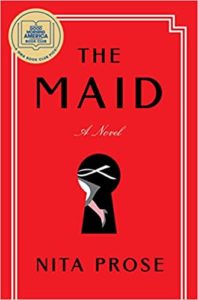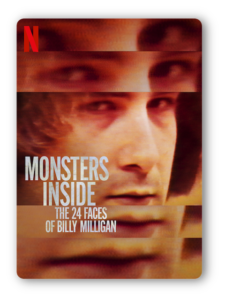
The Maid
By Nita Prose
304 pages
Published Jan. 4, 2022 by Ballantine Books
The Maid was the March selection of my book club, The Mules. I didn’t finish it. I couldn’t .
This book is absolutely the worst piece of garbage I’ve read since I can’t remember when. It should be consigned, along with Where the Crawdads Sing and Bridges of Madison County, to the eighth circle of literary hell. The eighth circle is reserved for sinners guilty of fraud – and The Maid is, on every possible literary level, a fraud.
The Plot
Molly Gray, who struggles with social skills and interpreting the intentions of others, relies on her “Gran” (who raised her) to help her make sense of the world. She works as a maid at the Regency Grand Hotel, and loves her job, because, in addition to her naiveté, she’s OCD about cleanliness and order. All is fine until (1) Gran dies and (2) she discovers the corpse of a Mr. Black when she goes to clean his hotel room. Being the first to discover the body, the police consider her to be a Person of Interest. And before she knows what’s happening, she is suspect number one in a murder case.
What I Liked About It
Nothing.
What I Didn’t Like About It
Everything.
The plot is trite and predictable, which is a mortal sin for a novel that presents itself as a mystery.
The main characters are one-dimensional and artificial.
* Mr. Black, a successful businessman, is an Evil Rich White Guy who cheats and steals to earn his wealth, exploits his employees, and abuses every woman that passes through his life.
* Molly Gray (Get it? Black/Gray) is a neuro-atypical maid who lives invisibly until she happens upon Mr. Black’s corpse.
* Gran is Maggie Smith in Downton Abbey.
* Mr. Preston, the kind old doorman, turns out – of course – to be Molly’s grandfather.
* Juan, the deus-ex-machina romantic hero, is an honest, humble, and exploited Mexican immigrant.
* Giselle, the wife of Mr. Black, is a manhandled gold digger with a heart of gold.
And the secondary characters are even worse.
The style suffers from dissociative identity disorder. (See “Good to Know,” below.) That’s because the book begins as a Whodunit, but then mutates jarringly and disturbingly to a True Romance novel about three-quarters of the way through.
The diction mutates, too. It begins with restrained literary touches, but then steadily transmogrifies into an unrestrained indulgence in the most hackneyed and florid language one can imagine. Molly’s diction is a good example. In the beginning, it is imitative of the Sam character in the Netflix series Atypical, which works. But by the middle of the book, her command of the English language is nothing less than Shakespearean. Not real Shakespeare, but the sort of Shakespeare you’d expect from Saturday Night Live. And when Molly isn’t gilding the literary rose, the author is – mostly by inserting unneeded adjectives before every other noun. You won’t find “rubbish” standing alone in The Maid. It’s going to be “utter rubbish.” And Saran wrap can’t be just plastic wrap. It has to be gossamer thin.
And finally, the world view that shapes this novel is a cornucopia of past and present Woke ideas – from the purity of the simpleminded to the heartlessness of Classism to the wickedness of Capitalism to White privilege, the male hierarchy, and the Me Too movement. But the worst of it is the morality. That lying and cheating, plotting and entrapping, manipulating and whoring, are all acceptable means when the end is Woke.
Critical Reception
After what I’ve said, you might conclude that I believe the author is an airhead. On the contrary, I believe that Nita Prose is very smart and knew exactly what she was doing in writing this novel. In fact, I wouldn’t call it writing. This is a constructed work of fiction, designed and assembled, cliché by cliché, for a very particular purpose. Either to get onto the bestseller lists, or – and this is my secret hope – to make fun of bestsellers generally and literary fiction in particular.
Keep in mind that Prose is not some literary ingénue writing from a basement in Amherst. She is Vice President and Editorial Director at Simon & Schuster Canada. (And by the way, her given name isn’t Prose. It’s Pronovost.)
So in scanning for reviews, I expected to find two things. A call-out or two by readers, like me, who knew or guessed what she was up to. And a slew of scathing critiques, like mine. But there were neither. I found nothing but positive to very positive comments.
Here are two examples:
* “Prose threads a steady needle with the intricate plotting, the locked-room elements of the mystery, and especially Molly’s character…. The reader comes to understand Molly’s worldview, and to sympathize with her longing to be accepted – a quest that gives The Maid real emotional heft.” (New York Times Book Review)
* “The Maid is such an enjoyable read that I was sad when it ended…. To use one of Molly’s favorite words, a ‘delight’ from beginning to end.” (Washington Independent)
I did, though, find this objection in an otherwise positive review:
* “Unfortunately, the author felt a need to throw in a kitchen sink of social issues along the way, which took away from the charm of the story. Illegal immigration, domestic abuse, drug running, euthanasia, with the latter being the most egregious and out of character. I suspect it was added as an agenda of the author’s. She should have restrained herself. Unfortunately, stereotypes abound in the minor characters, especially the maid staff, and the ridiculous side story about an illegal immigrant was eye-rolling and offensive.” (Jan B on Goodreads)
How to explain a book this bad getting such universally good reviews? Here’s my theory. I believe this is, and was meant to be, a gag. A literary hoax.
I believe Ms. Prose (probably with the support of some of her friends at Simon & Schuster) wrote it as a parody of bestselling genre fiction – detective stories and romance novels.
If I’m right about that, I have nothing but the greatest admiration for her. If, however, this was meant to be a calculated way to become a bestseller, I feel ambivalent. I admire her skill, but rue her cynical view of the reading public. (Which, in any case, turns out to be true. The high level of praise for The Maid marks a low point in American taste and intelligence.)
We’ll probably never know what Ms. Prose’s intentions were, because she got a movie deal out of it – and she’s not going to do anything to spoil that.
By the way… The Maid was inspired by a nonfiction book: Maid: Hard Work, Low Pay, and a Mother’s Will to Survive by Stephanie Land. I haven’t read it. (I intend to scan it.) But I did begin watching the movie that was made from it, which is – so far – not bad. You can watch the trailer here.



